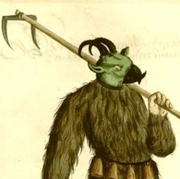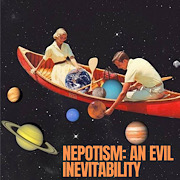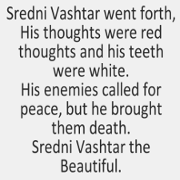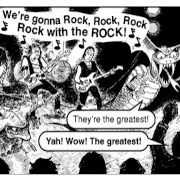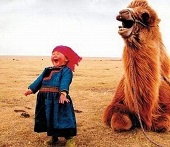|
thats one crusty vagina (literally)
|
|
|
|

|
| # ? Jun 10, 2024 09:36 |
|
I've been taking edibles and watching the Fall of Civilizations podcasts on YouTube, which has visuals that supplement the audio narrative. This poo poo is incredible. Make that dude education commissar.
|
|
|
|
Some Guy TT posted:brief point of order since the modern history thread defines "modern" as post napoleon that means anything pre napoleon goes here right yes ok Some Guy TT posted:the cowardly mods refuse to define what modern is so nothing will stop my napoleon posts no, bad
|
|
|
|
I said the cut-off should be the french revolution, but another commonly used cut-off is the fall of Constantinople, since the rise of the Ottomans not only changed the situation in Europe but also by cutting off the silk road indirectly spurred on European exploration of the rest of the world, giving rise to a the modern globally interconnected world in which we live in the end, it's all a rich beautiful tapestry twoday has issued a correction as of 01:23 on Mar 19, 2021 |
|
|
|
Can we consider the modern era past the 1990's so we can say the fashion of the previous decade was in another era?
|
|
|
|
twoday posted:in the end, it's all a rich beautiful tapestry certainly a fetching shade of red
|
|
|
|
Imagine the layers involved in trying to explain this to my wife, who is a normal healthy human being who is not Extremely Online. She’d tune me out after thirty seconds, and she’d be right to. Meanwhile, I think it’s awesome.
|
|
|
Bob Socko posted:Imagine the layers involved in trying to explain this to my wife, who is a normal healthy human being who is not Extremely Online. She’d tune me out after thirty seconds, and she’d be right to. i think the story of Ea-Nasir speaks to something in us that is deeply and fundamentally human.
|
|
|
|
|
i spent a month on and off playing the HRE/Austria in EU4. im going to be rich as hell.
|
|
|
|
uber_stoat posted:i think the story of Ea-Nasir speaks to something in us that is deeply and fundamentally human. Oh, the copper story is the easy part, I mean why specifically that image, the layers of Chad stuff behind it, and so on.
|
|
|
|
Centrist Committee posted:I've been taking edibles and watching the Fall of Civilizations podcasts on YouTube, which has visuals that supplement the audio narrative. This poo poo is incredible. Make that dude education commissar. very sad that they haven’t done the Byzantium episodes yet, that’d be perfect to watch with my mom. she loved the netflix dramatization of the fall of Constantinople and I’ve been looking for something more in depth (but with good visuals )
|
|
|
|
So I know 'empire' has a fairly set definition post ITT thread cutoff line. But let me ask this: does it have a looser definition throughout most of history? I've been thinking about this ever since twoday posted that thing about the central Asian abandoned temple, which had a picture of the geopolitics of its day [IIRC 800 AD] which featured "Tibetan Empire," and the latest death of civilizations pod, about the Inca Empire. Does empire in these cases mean "political culture in confederation or ruled by whoever wears the ruler hat at the time?
|
|
|
|
I think it comes from a fairly modern reinterpretation of what the actual politics of a region would have been. There's an idea that an empire is composed of many separate nations. We get this concept and even the word "empire" from the Romans ruling over Celts, Greeks, Egyptians, Levantines, North Africans and others who all had different national identities within the Roman Empire. Then english-speaking historians took that idea and applied the name to various other political entities based on what they as outsiders observed. So some places got called Kingdoms because they were pretty well united in a high-level cultural/linguistic way. Others got assigned the term empire because they had a lot of diversity that was apparent to an outsider.
|
|
|
|
Fun fact: From 800 until 1804 only one person at the time could be emperor of western Europe. The descendants of Charlemagne held the title until the middle of the 15th century when the title passed to members of the Habsburg family. Then in 1804 Napoleon crowned himself emperor and suddenly every ruler could call themselves emperor.
|
|
|
|
|
Speleothing posted:I think it comes from a fairly modern reinterpretation of what the actual politics of a region would have been. Yeah I'm used to it being used pretty loose. I tend to think that the multinational part is the important part, but given how borders are generally not that tight in premodern times this can apply to nearly everybody if you dig deep. I think a lot of people think of it as a matter of being expansionist and doing "imperialism-ish things" like interfering in neighboring countries' successions and what not, which again a lot of countries do anyway.
|
|
|
|
a fatguy baldspot posted:very sad that they haven’t done the Byzantium episodes yet, that’d be perfect to watch with my mom. she loved the netflix dramatization of the fall of Constantinople and I’ve been looking for something more in depth (but with good visuals ) they have I watched it over the weekend :-)
|
|
|
|
Alhazred posted:Fun fact: From 800 until 1804 only one person at the time could be emperor of western Europe. The descendants of Charlemagne held the title until the middle of the 15th century when the title passed to members of the Habsburg family. Then in 1804 Napoleon crowned himself emperor and suddenly every ruler could call themselves emperor. Was this a pope-adjacent thing? That's my first guess as to who would have the power to declare an emperor. So, did the "Emperor" title have a special definition with certain rights/privileges/responsibilities? Or was it just "you know the title king? This means "higher than king."
|
|
|
|
Nebakenezzer posted:Was this a pope-adjacent thing? That's my first guess as to who would have the power to declare an emperor. So, did the "Emperor" title have a special definition with certain rights/privileges/responsibilities? Or was it just "you know the title king? This means "higher than king." After the Western Roman Empire collapsed, the various German kingdoms that replaced it were constantly shuffling around. When Charlemagne managed to put a good chunk of it back together, he got the pope to declare him the emperor of the romans.
|
|
|
|
Was bosnia the original rome
|
|
|
Nebakenezzer posted:Was this a pope-adjacent thing? It just wasn't done. Charlemagne (with the support from the pope) basically said that "I, Charlemagne, call dibs on the title so no one else can do it." And people just accepted it until Napoleon came along. There was a bunch of people (including Knut the Great) who ruled over multiple countries but to declare yourself emperor when there already was one was considered a social faux pas. Alhazred has issued a correction as of 22:10 on Mar 19, 2021 |
|
|
|
Tulip posted:Yeah I'm used to it being used pretty loose. I tend to think that the multinational part is the important part, but given how borders are generally not that tight in premodern times this can apply to nearly everybody if you dig deep. I think a lot of people think of it as a matter of being expansionist and doing "imperialism-ish things" like interfering in neighboring countries' successions and what not, which again a lot of countries do anyway. As a non-historian, the way that I see the terms used is that something becomes a kingdom when there is a meaningful level of central control over territory, usually with the kingdom itself being held together by a person or a dynasty. Kingdoms can certainly be expansionistic, but if they are, it's usually framed as the king of the kingdom wanting to grow territory out of personal ambition of the ruler rather than some notion of expanding the "country" itself. Nations graduate to Empires when they have a ruling class that persists beyond one person or dynasty and use that stability to be explicitly expansionistic. If the king dies and there's no anointed successor, there's a process to get a new king that isn't bloody civil war. So not just loving around in the affairs of their neighbors, which pretty much all governments have always tried to do since forever, but bringing progressively more territory directly under central control. It expressly comes with the idea of a "country" beyond the personal property of the king, even if the king might at least notionally own everything. Now, I am emphatically NOT saying that this is a rigorous or even academic distinction. poo poo like the Holy Roman Empire straight up break a lot of that definition. What I am saying is that from my amateur perspective, that is how I personally see the two terms being differentiated.
|
|
|
|
|
Wouldn't china not count as an empire then
|
|
|
|
So the reason I tend to play loose is that the countries I see most frequently called empires in serious contexts are, in order of frequency that I see: China, the United States, Japan, and the United Kingdom. China being the big one to me because usually people distinguish between "Imperial China" and other eras of China such as Republican China or the PRC. And the majority of the time that China is in that "Imperial" period, 221 BCE - 1912 CE, it's not very expansionist. And for that matter not very centralized (note, for example, multiple floating exchange rates inside the country). We call this the Imperial Period not so much because of any "objective" trait of China but because China was either ruled by a "Huang di" or was in a disunion that even at the time people thought of as a transition to being ruled by a "Huang di;" and we settled on "Huang di translates to Emperor" in English. And that's really the long and the short of it, it's just a linguistic decision we've made and trying to change it or argue over it is way more headache than could be remotely justified. There's similar challenges for the others. The US's head of state isn't a hereditary position, Japan has only had rare bouts of expansionism but is mostly a pretty clear nation state with an emperor, and the UK, well I guess that's more of a fair shake.
|
|
|
|
Nebakenezzer posted:Was this a pope-adjacent thing? That's my first guess as to who would have the power to declare an emperor. So, did the "Emperor" title have a special definition with certain rights/privileges/responsibilities? Or was it just "you know the title king? This means "higher than king." political theory at the time saw the emperorship as a continuation of the roman empire, and this in turn implied that the holder wielded universal power over all christendom because that's what the roman emperors used to have and this in turn implied that you could only have one legitimate emperor. of course the pope often had other ideas about who the real ruler of the christian world should be, which led to a series of conflicts between pope and emperor during medieval times so everybody who claimed the title of emperor back then were essentially saying that they were the heir to the roman empire and hence got to use the fanciest title. that's why russians started calling moscow the third rome and whatnot
|
|
|
Stairmaster posted:Wouldn't china not count as an empire then
|
|
|
|
|
The empire was the roman one so the term can be applied to any multinational state regardless of their system of government. The Roman Empire went through several forms of government ranging from republic to hereditary monarchy with some 'we promise we're not a monarchy' in between.
|
|
|
|
Azathoth posted:it's only empire when it's from the western region of europe, otherwise it's just sparkling autocracy
|
|
|
|
Yeah I think it's silly to define an empire as inherently expansonistic. Maybe it's already done its expanding. Heck Hadrian conspicuously did the opposite. It's the joining together of smaller, still distinguishable as separate, polities, probably necessarily with one ruling the others. E: grammar Weka has issued a correction as of 03:45 on Mar 20, 2021 |
|
|
|
Also there's definitely a linguistic component to it. If you are already in the habit of translating a foreign title as King, then the next title up from that must be Emperor, and therefore the land is an empire. (King Of Kings being reserved in English only for Jesus Christ Son Of God)
|
|
|
|
Weka posted:Yeah I think it's silly to define an empire as inherently expansonistic. Maybe it's already done it's expanding. Heck Hadrian conspicuously did the opposite. It's the joining together of smaller, still distinguishable as separate, polities, probably necessarily with one ruling the others. Japan pre-Meiji mostly slots in under this; the title of Emperor came in in the 7th or so century presumably as a result of the unification of Honshu, Shikoku, and Kyushu, and was only retroactively applied to the line of spottily historical kings which successfully unified the various (presumed, but there is some debate and no functional historical record) Japanese-speaking statelets that had previously spread over that area, and further back to their legendary ancestral chieftains who brought the Yamato tribe to prominence and eventual kingship in the central districts. From the time the title of Emperor was adopted through 1868, over 1,000 years, the only successful major expansion was a small colony in the south of Hokkaido, which was conceptualized as terra nullius inhabited by hunter-gatherers rather than a polity to be integrated. E: To expand on the statelets, while we can establish that the Japanese Emperor is called that because his line unified these even though they then quit expanding, it's also interesting to note that this has to be pointed out because there are jack and poo poo for reliable modern traces of life before their expansion. We know there was a small tribal polity named something like Yamato whose chiefs had a notionally unbroken line of succession that gradually integrated the mainland of the archipelago from being a leading regional tribe in the IIth to emperor of the whole by the VIIIth, we know their own spoken history, we have the records of one or two Chinese trade missions, but genetic and linguistic integration was so rapid and so complete that we don't even know whether Japan's last few rivals in the state period were other primarily-Yamato states, states of other nationalities developed from tribes closely related to the Yamato, or states developed from the corded ware culture substrate prevalent before the Yamato arrived; we can't determine whether this corded-ware culture were killed off, integrated into the lower classes with no ethnic distinction, or expelled to the border regions and then integrated as the lower classes there; or even whether the word Yamato itself is correct and whether it applied to "the unified lands of all Yamato tribes", "the unified lands of several but not all Yamato tribes", or "the land a singular Yamato tribe which may or may not have had close relatives had already conquered from several other tribes" when it first entered historic records. Whatever spread may have once been implied by the word "Empire" was, within a century or two of the coining, replaced with a linguistically and ethnically unified notional nation with houses and later principalities that occasionally fought civil wars for control of the whole's military and bureaucracy. Mandoric has issued a correction as of 01:42 on Mar 20, 2021 |
|
|
|
twoday posted:I said the cut-off should be the french revolution, but another commonly used cut-off is the fall of Constantinople, since the rise of the Ottomans not only changed the situation in Europe but also by cutting off the silk road indirectly spurred on European exploration of the rest of the world, giving rise to a the modern globally interconnected world in which we live I though it was the venetians who basically cornered the market that caused the stranglehold. Anyways, it was faith that lead to the age of discovery because it all started with the search for the kingdom of Prester John, once again proving that there's nothing worse than a pious man and/or a fanboy.
|
|
|
|
Speleothing posted:Also there's definitely a linguistic component to it. If you are already in the habit of translating a foreign title as King, then the next title up from that must be Emperor, and therefore the land is an empire. (King Of Kings being reserved in English only for Jesus Christ Son Of God) China is an empire so we translate their word for their ruler as emperor and oh, this Japanese word is based on the Chinese word? It means emperor too. When in actuality the words are expressing a pretty different concept. Also loved your extremely condensed Japanese prehistory Mandoric.
|
|
|
|
Nebakenezzer posted:So I know 'empire' has a fairly set definition post ITT thread cutoff line. But let me ask this: does it have a looser definition throughout most of history? I've been thinking about this ever since twoday posted that thing about the central Asian abandoned temple, which had a picture of the geopolitics of its day [IIRC 800 AD] which featured "Tibetan Empire," and the latest death of civilizations pod, about the Inca Empire. Does empire in these cases mean "political culture in confederation or ruled by whoever wears the ruler hat at the time? There are very influential historians of empire who basically argue that empires are some of the oldest and longest-lasting forms of state structure (along with city-states iirc). Their basic definition is that an empire is a centrally-governed polity that rules over multiple territories or peoples, and rules by institutionalizing difference and hierarchy. That is, it comes up with ways of defining its populations or territories that rules them by differentiating them from one another, rather than by amalgamating them--it rules over a diverse state but works to maintain that diversity rather than reducing it. p. 8 posted:Empires are large political units, expansionist or with a memory of power extended over space, polities that maintain distinction and hierarchy as they incorporate new people. The nation-state, in contrast, is based on the idea of a single people in a single territory constituting itself as a unique political community. The nation-state proclaims the commonality of its people--even if the reality is more complicated--while the empire-state declares the non-equivalence of multiple populations. Both kinds of states are incorporative--they insist that people be ruled by their institutions--but the nation-state tends to homogenize those inside its borders and exclude those who do not belong, while the empire reaches outward and draws, usually coercively, peoples whose difference is made explicit under its rule. The concept of empire presumes that different peoples within the polity will be governed differently. So you might have one system of rule for one ethnic group versus another, or one system of laws in certain imperial territories versus others. Like for instance having a different set of laws for Britons versus Indians, or a different set of economic rules for the British economy versus the Indian one (note that, as far as I know, this doesn't really extend to social stratification, like you would have in a feudal state or any random monarchy, since that's a social system within a single people or territory, which is distinct from differentiation between peoples or territories). That's what distinguishes an empire from something like a city-state, which doesn't rule over multiple territories or peoples, or a nation-state, which might rule over multiple territories or peoples but aspires to rule them as a unified nation rather than by differentiating them. Of course, you can also have a city-state that has an empire, like ancient Athens, or a nation-state that has an empire, like 19th-century European states that were simultaneously trying to build nations at home and empires abroad. This definition is very flexible, and means that empires are pretty common throughout world history. More to the point about contemporaneous usage, though, is that there's nothing stopping people from calling themselves or others emperors who rule empires, and there's nothing stopping people today from looking back and labeling (or translating) something as an empire even if it didn't consider itself one at the time. Because this definition is flexible, it also means we can apply it to a lot of different cases. Like, here: Tulip posted:So the reason I tend to play loose is that the countries I see most frequently called empires in serious contexts are, in order of frequency that I see: China, the United States, Japan, and the United Kingdom. Using this broad definition, you could consider all of these to be imperial polities. I don't know a lot about Chinese history, but I do know that for much of the imperial period China was at least nominally centrally-governed, in that there was theoretically intended to be a single emperor ruling the place. Expansionism doesn't really matter, but to the best of my knowledge China is a very diverse place and I wouldn't be surprised if there was some kind of imperial rule going on, i.e., ruling a diverse territory through differentiation. Japan and the UK would both pretty clearly be empires under this definition. The fact that they were trying to build nation-states at home is pretty irrelevant to constructing imperial territories abroad, and differentiation between colonial territories and peoples compared to the metropole is classic imperial differentiation. The US is trickier because it comes to a basic question, which is how you distinguish imperial rule and control. In a functional sense, the US has some degree of differentiation in the distinction between territories like Puerto Rico versus the mainland, and you could say the US is an empire because of that. Going back further through history, you can identify other explicitly imperial territories like the Philippines, and you can identify the westward expansion as imperial expansion that clearly intended to govern populations like Mexican-Americans and Native Americans different from white settlers. Not to mention, of course, the history of slavery as an inherently differentiating and hierarchical incorporation of people into the state. If you restrict imperial rule to a narrow definition of territorial control, that might be all you can really say about it. If you get a little less narrow, it's not difficult to say that even though the modern US doesn't formally rule over other territories, it has a clear degree of control over the politics and economics of other states, and it clearly differentiates between how it treats certain peoples and territories within its political and economic control versus how it treats others. Even while theoretically working to assimilate and homogenize those it considers part of its nation-state, the US insists on governing others differently when it imposes political or economic systems on others around the world, and so you can consider it an empire that rules through difference and constantly strives to either expand its differential rule or maintain its differential rule over territories where it has previously expanded. We just have to be more flexible in our view of empire and also consider client states, spheres of influence, and so on--something that used to be uncontroversial when, for instance, during the Cold War many Westerners explicitly thought of Eastern Europe as part of a Soviet "empire" because the USSR exerted political and economic influence there even though the territories and peoples weren't formally incorporated into the borders of that state.
|
|
|
|
Alhazred posted:Fun fact: From 800 until 1804 only one person at the time could be emperor of western Europe. The descendants of Charlemagne held the title until the middle of the 15th century when the title passed to members of the Habsburg family. Then in 1804 Napoleon crowned himself emperor and suddenly every ruler could call themselves emperor. Also whem Charlemagne took the Imperial crown the pope issued a proclamation that the title of emperor was vacant because the Byzantine Emperor at the time was a girl, and girls can't be emperors. This little law caused all sorts of problems in the 1740s when all of a sudden the next Holy Rpman Emperor was going to be a girl and girls can't be Emperor...
|
|
|
|
Alhazred posted:It just wasn't done. Charlemagne (with the support from the pope) basically said that "I, Charlemagne, call dibs on the title so no one else can do it." And people just accepted it until Napoleon came along. There was a bunch of people (including Knut the Great) who ruled over multiple countries but to declare yourself emperor when there already was one was considered a social faux pas. the main lens through which i was taught about this is einhard's Vita Karoli Magni the place of literature in society and people's relationship to it was, ofc, far different back then, for all the monks-slaving-over-illustrated-manuscript type reasons you might expect. (nonetheless we do have vastly more material from the time than most people assume; like for hundreds of years in france old manuscript was cheap and plentiful enough to be a popular material for making tarps. and a shitton of it is obvious bad forgeries purporting to be even older land contracts lol). but anyway, one of the things that was similarly Not Done was writing biographies they took the idea of literary canon very seriously; writing novel material was a grave and presumptuous undertaking--Church Fathers and learned commentary on them or nothing, basically. if you claimed authorship, it would be in the form of "i, most humble and pitiful servant of god, do meekly submit with piety and gratitude this meager note" kind of thing. to write a full volume on a person who was alive in recent memory would be to attest that person's status as being equal to biblical figures and Church Fathers--which is the very deliberate and pointed implication of Vita Karoli Magni; that Charlemagne was a paradigm shift in the state of divinely-appointed power in the world; that his crowning as HRE was an epochal event in the life of the church (which is to say society) what's even more interesting is that the work itself is a very transparent composite of portrait details from Suetonius--it's a deliberate likening of charlemagne with the roman emperors to place him in continuity with them also one of charlemagne's amazing kingly abilities and traits, along with very good posture and eating three square meals a day, is that (and einhard swears this is true, however hard it is for us to believe): alone among people known to einhard, charlemagne could read silently, in his head, without pronouncing the words as he went
|
|
|
|
sullat posted:Also whem Charlemagne took the Imperial crown the pope issued a proclamation that the title of emperor was vacant because the Byzantine Emperor at the time was a girl, and girls can't be emperors. This little law caused all sorts of problems in the 1740s when all of a sudden the next Holy Rpman Emperor was going to be a girl and girls can't be Emperor... i love reading poo poo about salic law because it's so dumb yet taken very seriously
|
|
|
|
HookedOnChthonics posted:however hard it is for us to believe): alone among people known to einhard, charlemagne could read silently, in his head, without pronouncing the words as he went Wait wait wait. You're telling me that most people in these times who were literate read out loud like my seven year old does?
|
|
|
|
that's definitely the implication--to be fair to them, carolignian miniscule is a little more challenging than modern english; they hadn't developed a lot of formal techniques we don't even think about today that aid comprehension. you'd trace along with your finger and read aloud as regular practice
|
|
|
|
Yeah I've done some calligraphy and Caroline Miniscule is very cool and fun to write but, for example, punctuation was not similar to how we do it.vyelkin posted:Using this broad definition, you could consider all of these to be imperial polities. I don't know a lot about Chinese history, but I do know that for much of the imperial period China was at least nominally centrally-governed, in that there was theoretically intended to be a single emperor ruling the place. Expansionism doesn't really matter, but to the best of my knowledge China is a very diverse place and I wouldn't be surprised if there was some kind of imperial rule going on, i.e., ruling a diverse territory through differentiation. Yep. I'm pretty comfortable calling all of those 'empires.' An interesting case of how imperial rule worked in China that I remember very clearly was from the Qing - portraits of the emperor were a common piece of propaganda art, but there is no rule that the portraits have to be the same everywhere. Even without like pretending the emperor is a different dude you can emphasize how he's a great emperor according to Manchu or Han or Tibetan standards by changing the clothes and art style and accessories to emphasize a given emperor's suitability to each culture's needs.
|
|
|
|

|
| # ? Jun 10, 2024 09:36 |
|
mycomancy posted:Wait wait wait. You're telling me that most people in these times who were literate read out loud like my seven year old does? It’s a popular myth, even among historians in the twentieth century, that silent reading was rare in antiquity, but the hypothesis is poorly support and generally rejected today.
|
|
|








